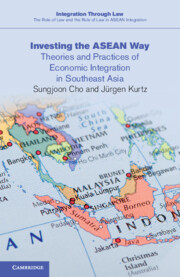58 results
Chapter 4 - Positioning of the ASEAN Investment Regime
-
- Book:
- Investing the ASEAN Way
- Published online:
- 10 November 2022
- Print publication:
- 24 November 2022, pp 116-156
-
- Chapter
- Export citation
Copyright page
-
- Book:
- Investing the ASEAN Way
- Published online:
- 10 November 2022
- Print publication:
- 24 November 2022, pp vi-vi
-
- Chapter
- Export citation
Abbreviations
-
- Book:
- Investing the ASEAN Way
- Published online:
- 10 November 2022
- Print publication:
- 24 November 2022, pp xxvii-xxx
-
- Chapter
- Export citation
Chapter 5 - Synthesis
-
- Book:
- Investing the ASEAN Way
- Published online:
- 10 November 2022
- Print publication:
- 24 November 2022, pp 157-215
-
- Chapter
- Export citation
Preface
-
- Book:
- Investing the ASEAN Way
- Published online:
- 10 November 2022
- Print publication:
- 24 November 2022, pp xi-xiv
-
- Chapter
- Export citation
Contents
-
- Book:
- Investing the ASEAN Way
- Published online:
- 10 November 2022
- Print publication:
- 24 November 2022, pp vii-viii
-
- Chapter
- Export citation
Figures
-
- Book:
- Investing the ASEAN Way
- Published online:
- 10 November 2022
- Print publication:
- 24 November 2022, pp ix-ix
-
- Chapter
- Export citation
Chapter 2 - The Foundation of the ASEAN Investment Regime
-
- Book:
- Investing the ASEAN Way
- Published online:
- 10 November 2022
- Print publication:
- 24 November 2022, pp 28-75
-
- Chapter
- Export citation
Table of Cases
-
- Book:
- Investing the ASEAN Way
- Published online:
- 10 November 2022
- Print publication:
- 24 November 2022, pp xxiii-xxvi
-
- Chapter
- Export citation
Index
-
- Book:
- Investing the ASEAN Way
- Published online:
- 10 November 2022
- Print publication:
- 24 November 2022, pp 286-288
-
- Chapter
- Export citation
Chapter 6 - Conclusion: Economic Regionalism and ASEAN Investment
-
- Book:
- Investing the ASEAN Way
- Published online:
- 10 November 2022
- Print publication:
- 24 November 2022, pp 216-252
-
- Chapter
- Export citation
Chapter 1 - Introduction
-
- Book:
- Investing the ASEAN Way
- Published online:
- 10 November 2022
- Print publication:
- 24 November 2022, pp 1-27
-
- Chapter
- Export citation
Acknowledgments
-
- Book:
- Investing the ASEAN Way
- Published online:
- 10 November 2022
- Print publication:
- 24 November 2022, pp xxi-xxii
-
- Chapter
- Export citation
Chapter 3 - Tracing Influences on the ASEAN Investment Regime
-
- Book:
- Investing the ASEAN Way
- Published online:
- 10 November 2022
- Print publication:
- 24 November 2022, pp 76-115
-
- Chapter
- Export citation
General Editors’ Preface
-
- Book:
- Investing the ASEAN Way
- Published online:
- 10 November 2022
- Print publication:
- 24 November 2022, pp xv-xx
-
- Chapter
- Export citation
Bibliography
-
- Book:
- Investing the ASEAN Way
- Published online:
- 10 November 2022
- Print publication:
- 24 November 2022, pp 253-285
-
- Chapter
- Export citation
Tables
-
- Book:
- Investing the ASEAN Way
- Published online:
- 10 November 2022
- Print publication:
- 24 November 2022, pp x-x
-
- Chapter
- Export citation

Investing the ASEAN Way
- Theories and Practices of Economic Integration in Southeast Asia
-
- Published online:
- 10 November 2022
- Print publication:
- 24 November 2022
14 - Principles Governing the Global Economy
- from Part II - Fundamental Principles of International Law beyond the Friendly Relations Declaration
-
-
- Book:
- The UN Friendly Relations Declaration at 50
- Published online:
- 21 September 2020
- Print publication:
- 08 October 2020, pp 331-361
-
- Chapter
- Export citation
Part II - Top-Down: Public Approaches to Achieving the Sustainable Development Goals
-
- Book:
- International Trade, Investment, and the Sustainable Development Goals
- Published online:
- 18 September 2020
- Print publication:
- 01 October 2020, pp 109-174
-
- Chapter
- Export citation

